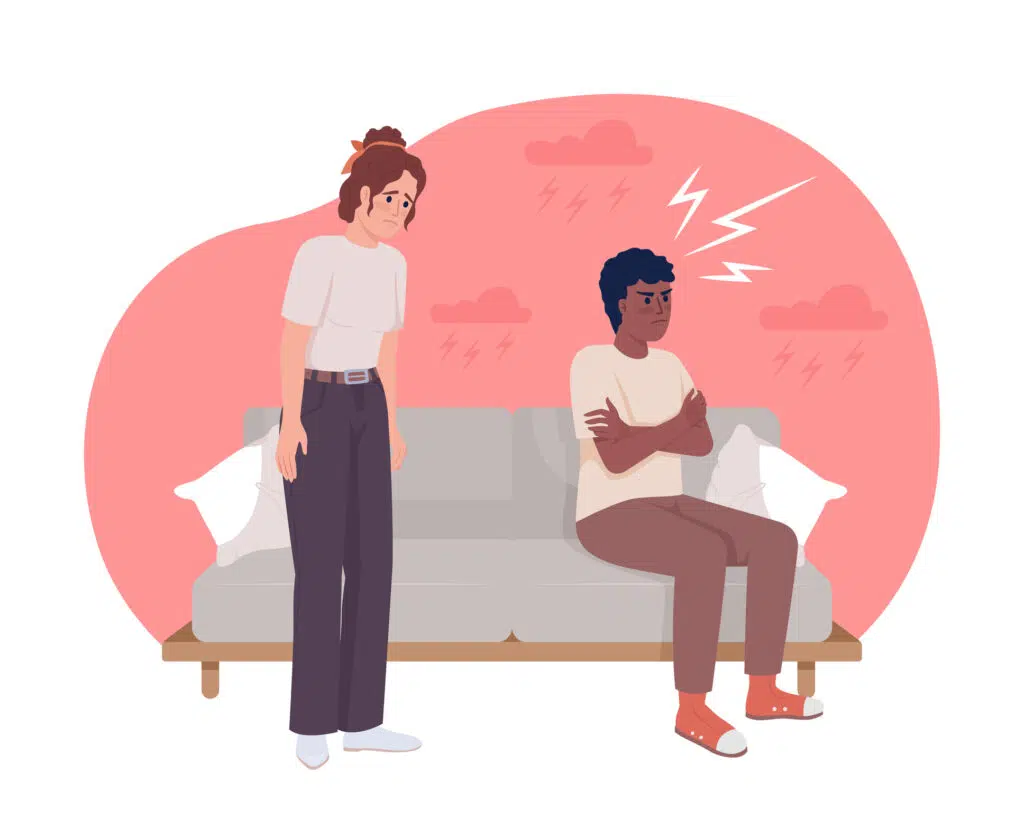Should I Look Through My Partner’s Phone?

Have you ever thought about looking through your partner’s phone? Just a little peek. The problem is that feeling like you’re under surveillance can be extremely upsetting and damaging for the relationship in the long run. Nowadays, phones include your innermost thoughts, feelings, and expressions. Even if you fear your partner is cheating, going through their phone can have unforeseen and extreme consequences. While snooping on another person has never been easier, it doesn’t mean that you should do it. When there’s a lack of trust, looking through your partner’s phone could point to other underlying issues within the relationship.
Is it OK to Look Through Your Partner’s Phone?
A 2012 study found that roughly two-thirds of participants admitted to snooping through their partner’s private messages, including texts and social networking sites, without consent.
One company surveyed 1,000 Americans in 2020 between the ages of fifteen and fifty-five about their phone privacy and snooping in relationships. Here’s what they found:
- 48% of women and 31% of men think snooping is fine
- 60% think it’s never OK to look through a phone
- 43% found no romantically incriminating evidence
- 38% of couples broke up or got into a fight
So, is it OK to snoop through your partner’s phone? The answer is almost never. In some cases, for instance, following a mistrust, there may be an agreement where you are given permission to look through the phone. This could be a way to rebuild trust but is usually temporary. Looking through your partner’s phone can result in consequences. Some people, feel so violated that it’s a deal-breaker.
With apps, notes, messages, and call logs, you can find everything you need to know about a person from snooping through their phone. You can see who they are talking to and what they are saying. If you look through a person’s phone, it’s an invasion of privacy. Whether you have a justified reason or not to look, it’s important to think about the road you’re taking to uncover the truth. Will snooping through a partner’s phone help your current situation?
What it Means if You Want To Snoop Through Your Partner’s Phone
If you’re trying to find out how to snoop or what to look for when snooping, think about why you’re doing this. While quickly snooping through a partner’s phone may put your worries at ease, it could signify deeper relationship issues. The snooping behavior may be a sign of another problem. By understanding why you feel you need to look through your partner’s phone, you can find an alternative way to approach the situation.
May Have Trust Issues
When talking about snooping, one of the main issues is trust. A foundation of trust is crucial in any relationship. Dr. Tirrell DeGannes, Licensed Clinical Psychologist in New York City, says that looking through your partner’s phone “may infer that trust is not well-built between the two people in the relationship. Curiosity is one thing but actively going through someone’s phone is an exercise of mistrust. That person may be justified in not trusting the other, but that relationship should be looked at if that is the case.”
Insecurity and Low Self-Esteem
Feeling tempted to look at your partner’s digital devices “may come down to a lack of trust. The person checking the other’s phone has some reason to feel insecurity in the relationship, whether it be a history of being cheated on, lied to, or being told in the past that they’d have to be vigilant in order to prevent themselves from the inevitability of being cheated on,” says Dr. Tirrell DeGannes.
May Suspect Cheating
If you suspect cheating, usually, there’s a better way to find out the truth than snooping through your partner’s phone. Whether you’re fueled by jealousy or a light curiosity, there are other ways to start the conversation. If you suspect cheating, start by thinking about why you suspect it. Previously infidelity or conflict in the relationship could make it difficult for you to trust another, or you could have a valid reason. Either way, looking for evidence of cheating behind your partner’s back could end badly.
Should You Go Through Your Partner’s Phone?
Often, partners have the ability to snoop. One study found that 1 in 3 women and 1 in 2 men know their partner’s phone passcode. 9 out of 10 women are even happy for their partner to look at their phone when asked. Having the ability to snoop and having permission to look through a phone create two very different situations. In some cases, asking to see a partner’s phone could put your mind at ease, but having those doubts in the first place could signal a problem.
If you’re asking yourself should I go through his/her phone, think about the consequences and the real reason you’re thinking about doing it. Maybe you’re checking a phone after cheating or following mistrust, but the truth is that, more often than not, you should not go through your partner’s phone.
Think about how you would feel if you caught your partner or husband going through your phone. It feels like a breach of privacy and trust, making you question the foundation of the relationship.
The Negative Relationship Effects of Looking Through Your Partner’s Phone
Although it can be tempting to look at your partner’s phone, it’s vital to understand the negative relationship effects that can arise from it. There are several reasons why you shouldn’t go through a phone, even if it’s easy to do and no one will ever know.
It Could Set the Relationship Back
Researchers from the University of British Columbia and the University of Lisbon found that in cases where the relationship ended after snooping on a partner’s phone, it was either because the phone owner felt betrayed or the relationship wasn’t that strong, to begin with. While the study was small, it highlights the importance of who you allow to use your phone, the trust you have, and the boundaries within the relationship. While looking through a phone isn’t a deal-breaker for all, it’s heavily dependent on the relationship and foundation it’s built on.
Invades a Person’s Privacy and Trust
When talking about snooping, it’s a conversation about privacy and trust. Whether it’s an iPad, phone, or laptop, looking through a device without consent raises an issue. When you feel that invasion of trust, it can have a big impact on the relationship as a whole. Whether you find what you’re looking for or not, it’s something that you can’t undo.
One study found that avoidance was associated with perceiving a partner as intrusive and establishing distance in response. While you can think that the more you know about your partner, the closer you can get, being intrusive can have the opposite effect.
There Can be Unintended Consequences
You never really know what’s going to happen next. If a partner feels betrayed or concerned about the lack of trust, there could be unexpected consequences. Dr. Tirrell DeGannes says that snooping through a partner’s phone is “usually symptomatic of greater issues that will come out in multiple areas of the relationship.”
May Be Unable to Set Healthy Boundaries in the Future
Modern-day relationships have a lot to cover, including how they navigate the digital world. Setting healthy boundaries is important in all types of relationships, not just romantic ones. Part of setting those boundaries includes whether you’re OK with your partner looking at your phone. You may be fine with your partner using your phone to make a call, but you would be uncomfortable if they started to read all your private messages despite having nothing to hide. After breaking a level of trust, you may find it difficult to set healthy boundaries within the relationship in the future.
Is Going Through Someone’s Phone Abuse?
Nowadays, phones are essentially a digital diary of an individual. If someone were to go through your phone and post images online without your permission, then this would be considered a type of digital abuse. If a partner constantly goes through your phone and social media, it could signify controlling and unhealthy behavior. If they are always checking on your calls, texts, social media, and digital activity, you may have a controlling and potentially abusive partner.
What Does It Mean When Someone Goes Through Your Phone?
When someone goes through your phone, they may be looking for something specific or just trying to snoop. Either way, there is a lack of trust and a violation of privacy. It shows that there is distrust and insecurity within the relationship.
It’s important to know that all relationships are different, and you will likely have agreements with what you both deem acceptable. Maybe you would take your partner’s phone to do a quick Google search, but that doesn’t mean you would go through their social media messages and texts.
What to Do Instead of Checking Your Partner’s Phone
Your partner’s phone is on the table, you know the password, and they are in the shower; what do you do? Although this sounds like the perfect opportunity to snoop, try to resist. It’s entirely normal to feel tempted to look, but take a deep breath and step back. Dr. Tirrell DeGannes recommends that instead of checking your partner’s phone, try the following steps:
- Ask about the person’s everyday communications and share yours
- Express why you feel the need to go through someone’s phone
- Work together on not having secrets
If you’re thinking, “my boyfriend won’t let me look at his phone,” it makes sense that you may be suspicious. Maybe you’re hiding your phone, and your partner is suspicious. It’s normal for situations to unravel that bring up questions in a relationship. It can feel like checking your partner’s phone can avoid a difficult conversation, but open communication and honesty set the foundation for a healthy relationship.
Start with a conversation where you try to explain how you feel and why you are tempted to look through your partner’s phone. Work to build a strong foundation of trust so that you no longer feel you don’t have all the information you need. This is by no means a quick fix; it requires effort from both parties to work on the relationship.
If you find it difficult to have an open conversation with your partner and feel like you could benefit from couples counseling, we can help you find counseling services near you. Both individuals and couples therapy can give you a platform to communicate and find a resolution together. Contact one of our offices in New York, Florida, California, Minnesota, New Jersey, and Oregon, or schedule an online appointment.

How to Move On After a Friendship Breakup
Friendship breakups can sting just as much as a romantic breakup. After all, you’re experiencing a loss of shared history and an understanding of each other that can leave you feeling lonely and isolated. Not all friendships are forever, but moving on from the loss of a friendship does take time and some self-compassion.

Signs You’re in a Toxic Relationship
A toxic relationship can chip away at your well-being and happiness. Toxic partners can be manipulative and charming, making it difficult to recognize the signs that you’re in a toxic relationship. You deserve to be in a supportive and healthy relationship.

10 Common Marriage Reconciliation Mistakes to Avoid After Infidelity
Infidelity can leave couples devastated. If you’ve been affected by infidelity and want to salvage your relationship, rebuild trust, or make a tough decision, keep reading for 10 common reconciliation mistakes to avoid after infidelity.

Survey: 72% of Americans are Stressing About the Upcoming Presidential Election
Political viewpoints in the U.S. have always been contentious, but is the impact of politics in the United States making it difficult for people to live their everyday lives? With some anticipating another brutal and long campaign season ahead of the upcoming 2024 presidential election, nearly half of Americans say politics is negatively impacting their mental health.




